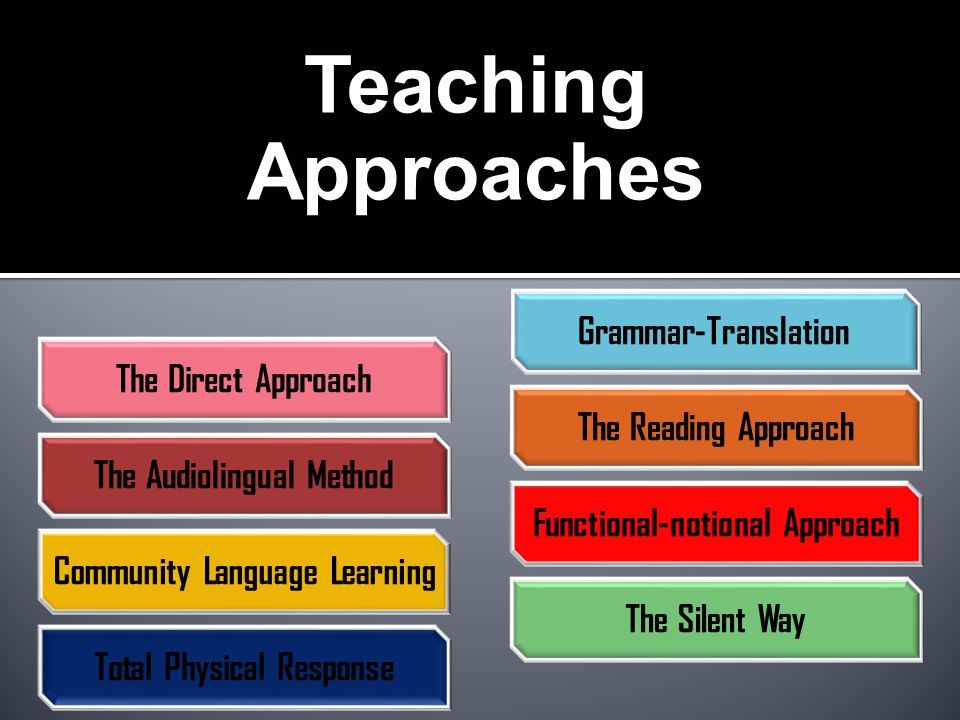When does a man go through midlife crisis
Midlife Crisis in Men: Signs, Causes & Solutions
Picture a “midlife crisis” and you’ll probably think of a middle-aged man impulsively purchasing a sports car, leaving his spouse and starting to see a younger girlfriend. Maybe this mental picture even involves him quitting his job to spend more time on the golf course.
The midlife crisis has become a staple of pop culture, appearing in countless TV shows, movies and other forms of media.
While the stereotypical midlife crisis similar to what’s described above does sometimes happen, most midlife dissatisfaction in men is different. For some, getting older can involve abrupt, major changes. However, for many, the signs of a midlife crisis are much more subtle.
Below, we’ve explained what a midlife crisis is, as well as how the common perception of midlife crises relates to clinically recognized mental health conditions.
We’ve also listed common signs of dissatisfaction and poor mental health that can occur in men as they enter a new stage of life in their 40s, 50s or 60s, as well as the options that are available for making progress and feeling better.
What Exactly Is a Midlife Crisis?
Before we get into details, one thing that’s important to clear up is that a midlife crisis isn’t really a recognized mental health condition.
By this, we mean that if you, as a man, are starting to feel dissatisfied with your life in your 40s, 50s or 60s, your mental health provider isn’t going to formally diagnose you with a midlife crisis and prescribe medication or a specific type of “midlife crisis management” therapy.
The midlife crisis is more of a social phenomenon than a specific mental illness. It’s a term that refers to the dissatisfaction, anxiety and feelings of depression or remorse that many men start to feel as they transition from the first part of their adult life into middle age.
During this period, it’s common to look back on things you may have planned and see that they didn’t come to fruition, or see your peers succeed in ways that might make you feel inadequate or as if you aren’t living up to your full potential.
The term midlife crisis was coined in the mid-1960s by Canadian social scientist Elliott Jaques. He observed that many of his middle-aged clients changed their behavior in response to coming face-to-face with their personal limitations and growing awareness of their mortality.
Although it’s normal to experience certain realizations with age and to change your thinking and behavior in response, the pop culture perception of the typical midlife crisis — a new car, divorce and younger partner, and an increased focus on personal appearance — isn’t really accurate.
In fact, research shows that only around 10 to 20 percent of men actually go through the typical “midlife crisis” as they get older.
However, many studies actually do support the idea that many people develop issues related to mental health in midlife. Although findings are mixed, some research suggests that a U-shaped curve in wellbeing that occurs during adulthood can reach its low point during middle age.
This change in your feelings, perception of yourself or mental health may spur you to take action and change certain aspects of your life.
Signs and Causes of Midlife Crises in Men
Because a midlife crisis isn’t a clinically recognized mental health issue, there aren’t any specific symptoms that mental health providers use to identify this issue in men.
It’s important to note that many of the cliché “signs of a midlife crisis” aren’t reliable indicators of mental health or wellbeing. If you’re in your 50s or 60s and just want to buy a Corvette, or if you no longer feel happy in your relationship, this doesn’t mean that you’re mentally unwell.
However, some of the symptoms and behaviors associated with a midlife crisis can be similar to those of known, clinically recognized mental health issues, including clinical depression, anxiety and professional burnout.
Signs of Clinical Depression in Middle Age
Major depressive disorder (MDD) is the most common mental disorder in middle-aged folks.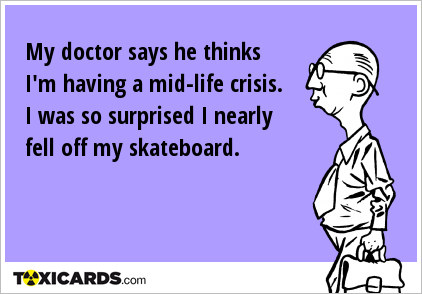 In fact, data from the 2020 National Survey on Drug Use and Health (NSDUH) suggests that 5.4 percent of people aged 50 and older experienced a depressive episode in the past year.
In fact, data from the 2020 National Survey on Drug Use and Health (NSDUH) suggests that 5.4 percent of people aged 50 and older experienced a depressive episode in the past year.
Sometimes, a midlife crisis may be a type of existential crisis that leads to depression symptoms — a phenomenon referred to as existential depression.
This type of event can occur due to changes in your life, such as your children leaving home, or a significant setback, such as job loss. The death of a parent or other person close to you could also trigger an existential crisis.
During a period of existential crisis, you may question your life decisions and think about making changes to your life.
You may experience the following symptoms of depression in middle age:
A persistent sad, negative and generally empty mood
Increased irritability and a “shorter fuse” with other people
Feelings of anxiety, pessimism and hopelessness
Difficulty focusing on tasks or remembering information
A sense that you’re guilty, worthless or unable to be helped
Slowed movement, speech and decision-making abilities
Insomnia (difficulty falling asleep or staying asleep) and/or oversleeping
Difficulty sitting still and a general feeling of restlessness
Changes in your appetite, eating habits and body composition
Reduced energy and a feeling that you’re physical fatigued
Aches, pains, digestive issues and other physical symptoms
Suicidal thoughts and/or attempts to commit suicide
It’s common and normal to experience some of these symptoms on an occasional basis, even if you’re not depressed.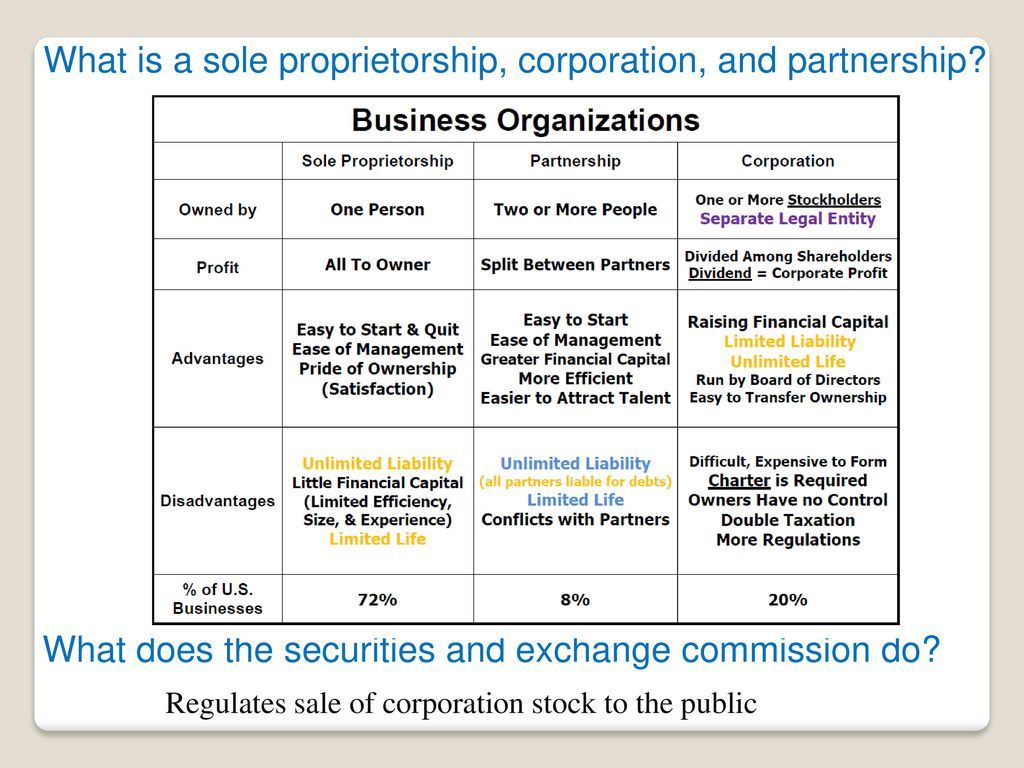
However, if you experience several symptoms which are persistent enough to affect you on a daily basis for two or more weeks, it’s possible that what seems like a midlife crisis could be clinical depression.
These symptoms can have a significant impact on your behavior, especially if they’re the result of an existential or emotional crisis. You may notice that you:
Change your sleep habits, such as sleeping less, more or sleeping poorly.
Notice a decline in your level or interest in work or workplace performance.
Pay less attention to your appearance and personal hygiene.
Experience a significant amount of weight gain or weight loss.
Withdraw from romantic relationships or friendships and hobbies.
Engage in unhealthy behaviors, such as drinking alcohol often or to excess.
Behave differently around other people, such as friends and family members.
Our full guide to the signs of clinical depression discusses these symptoms in more detail and explains how you can seek help.
Signs of Anxiety in Middle Age
It’s actually pretty common to experience anxiety disorder in middle age. In fact, research from 2001 to 2003 showed that approximately 20.6 percent of adults aged 45 to 59 experienced clinically significant anxiety disorder in the past year, although precise numbers may vary from year to year.
Anxiety can develop after a stressful or negative life event. Certain medical conditions that tend to become more common in middle age, such as heart arrhythmias and thyroid conditions, may also play a role in the development of anxiety symptoms.
Common symptoms of anxiety include:
Finding it difficult to concentrate
Feeling irritable, restless and wound-up
Physical symptoms, such as muscle tension
A general feeling of tiredness and fatigue
Feelings of worry that are difficult to control
Difficulty sleeping and/or unsatisfying sleep
Some aspects of growing older, such as changes in physical health or an increasing amount of awareness and fear of death, could potentially affect the development of these symptoms.
Our guide to anxiety symptoms in men provides more information about how anxiety may affect your thinking and behavior throughout your life.
online counseling
the best way to try counseling
Other Factors That May Contribute to a Midlife Crisis
In addition to existential concerns and established mental health conditions, a variety of other factors may all play a role in the midlife transition that many men go through as they enter into their 40s, 50s and 60s.
These may include:
Unhappy relationships. Research suggests that relationship satisfaction often dips as people approach middle age reaching a low point at around age 40, but then increases until around age 65, when it plateaus. This decline may play a role in the midlife blues experienced by some men.
Changes in hormone levels. It’s normal for your levels of certain sex hormones, such as testosterone, to decline with age. This can change the way you think and feel, and may play a role in some behavioral signs associated with a typical midlife crisis.

Public messages about aging. Messages in pop culture and marketing can make the process of growing older feel far from glamorous. This may affect your self-esteem and sense of life satisfaction.
Financial concerns. Midlife is often the peak of a person’s earning potential. This is often a positive thing, but it may also produce concerns about saving for retirement and growing expenses, including for necessities such as healthcare.
Empty nest syndrome. This is a psychological condition that can occur when children move out of home — a common occurrence during a person’s middle age. It may lead to feelings of grief, loss and difficulty adjusting to a new role in life.
How to Deal With a Midlife Crisis
Going through a midlife transition can be a challenging experience. For some men, it’s a more smooth transition from one phase of life to the next. For others, it may be a difficult period that involves sudden, difficult changes and mental health issues.
Try the following techniques and strategies to successfully navigate the changes, worries and concerns that may occur in middle adulthood.
Find Positive Ways to Deal With Midlife Concerns
One important thing to keep in mind is that what people may perceive as a typical midlife crisis isn’t always a negative thing. In fact, for many people, the existential questions that tend to pop up in middle age can potentially lead to positive outcomes.
For example, concerns about your appearance, negative health-related habits or an increasing risk of chronic illnesses can all serve as inspiration to improve your habits and take your health more seriously.
Likewise, a sense that you’ve missed out on certain opportunities to enjoy life can inspire you to spend more time doing the things you truly enjoy.
It’s important to differentiate between the negative aspects of popular culture’s idea of a midlife crisis and the positive ones.
There’s nothing wrong with exercising more, buying new clothes or taking steps to make aging less obvious. It’s also a great thing to get out and enjoy life more, especially if you’ve spent the last few decades of your life dedicating most of your time to career development.
It’s also a great thing to get out and enjoy life more, especially if you’ve spent the last few decades of your life dedicating most of your time to career development.
If your children have moved out of home, trading in the minivan for something a little more fun might even be a good idea, provided it’s financially sensible.
Since everyone’s needs and worries are unique, there’s no one-size-fits-all way to deal with a midlife crisis. In addition to the approaches mentioned above, other options include:
Traveling, including to other states or countries
Volunteering and taking part in charitable initiatives
Spending more time with friends, family and loved ones
Setting personal goals for yourself and working towards them
Letting people you trust know about your worries and feelings
The key is to focus on making positive, rational and realistic decisions, not impulsive ones that are driven by irrational fear or anxiety. Use your midlife concerns as a source of inspiration and you may find yourself feeling happier and more fulfilled.
Use your midlife concerns as a source of inspiration and you may find yourself feeling happier and more fulfilled.
For Serious Mental Health Issues, Talk to a Professional
When middle age brings up concerns that don’t have a potentially positive outcome, it’s important to seek professional help.
For example, if you think that you’re becoming depressed or developing an anxiety disorder as a result of an existential crisis, you should reach out to a mental health provider to discuss your symptoms.
It’s especially important to seek help if you have several of the depression or anxiety symptoms listed further up the page.
You can get help by talking to your primary care provider and asking for a mental health referral, by scheduling an appointment with a psychiatrist or psychologist in your city, or from your home with our online mental health services.
A mental health professional may recommend using medication or taking part in psychotherapy, or talk therapy, to improve your symptoms and quality of life.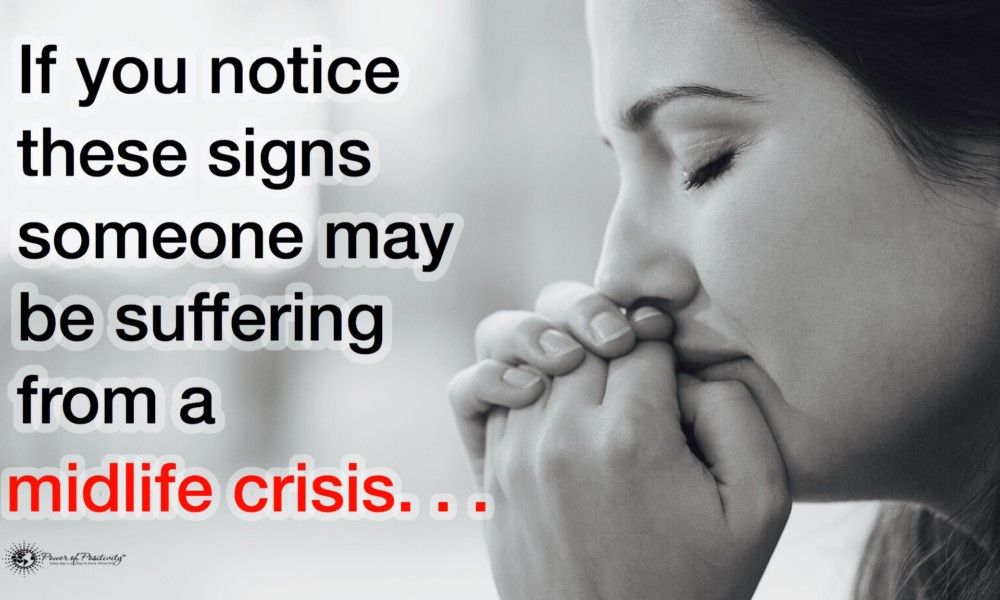
Medications used to treat depression and anxiety disorders include antidepressants and anxiety medications. If you’re prescribed medication, it’s important to take it exactly as directed by your mental health provider. Some medications may take several weeks to start working.
Psychotherapy can help you to identify negative thoughts, emotions and behaviors, then change them to improve your mental health and quality of life. A variety of types of therapy are used to treat depression, anxiety and other mental health issues that can occur in middle adulthood.
online psychiatrist prescriptions
talk to a psychiatry provider. it’s never been easier
Getting Through a Midlife Crisis
Growing older can be a rich, rewarding experience, but like everything else in life, it can involve plenty of ups and downs.
As you enter the middle of adulthood, realizing that half of your life has already passed can lead to serious questions and worries. Many of these can be channeled into positive changes, but it’s also possible for some to lead to depression, anxiety or other mental health issues.
If you’re worried about your mental health in middle age, it’s important to get expert help locally or by using our online mental health services.
There’s nothing shameful in seeking professional mental health help. In fact, doing so can help you to successfully navigate the challenges of middle age and enjoy this new stage of your life to the fullest.
11 Sources
Hims & Hers has strict sourcing guidelines to ensure our content is accurate and current. We rely on peer-reviewed studies, academic research institutions, and medical associations. We strive to use primary sources and refrain from using tertiary references.
- Infurna, F.J., Gerstorf, D. & Lachman, M.E. (2020, May-June). Midlife in the 2020s: Opportunities and Challenges. The American Psychologist. 75 (4), 470–485. Retrieved from https://www.ncbi.nlm.nih.gov/pmc/articles/PMC7347230/
- Major Depression. (2022, January). Retrieved from https://www.nimh.
 nih.gov/health/statistics/major-depression
nih.gov/health/statistics/major-depression - 6 Ways to Overcome an Existential Crisis. (2020, June 26). Retrieved from https://health.clevelandclinic.org/ways-to-overcome-an-existential-crisis/
- Depression. (2018, February). Retrieved from https://www.nimh.nih.gov/health/topics/depression
- How to help in an emotional crisis. (2013). Retrieved from https://www.apa.org/topics/mental-health/help-emotional-crisis
- Any Anxiety Disorder. (n.d.). Retrieved from https://www.nimh.nih.gov/health/statistics/any-anxiety-disorder
- Anxiety Disorders. (2018, July). Retrieved from https://www.nimh.nih.gov/health/topics/anxiety-disorders
- Bühler, J. L., Krauss, S. & Orth, U. (2021). Development of relationship satisfaction across the life span: A systematic review and meta-analysis. Psychological Bulletin, 147 (10), 1012-1053. Retrieved from https://psycnet.apa.org/fulltext/2022-16081-001.
 html
html - Testosterone. (2020, January 26). Retrieved from https://medlineplus.gov/ency/article/003707.htm
- Bougea, A., Despoti, A. & Vasilopoulos, E. (2019, October-December). Empty-nest-related psychosocial stress: Conceptual issues, future directions in economic crisis. Psychiatriki. 30 (4), 329-338. Retrieved from https://pubmed.ncbi.nlm.nih.gov/32283536/
- Psychotherapies. (2021, June). Retrieved from https://www.nimh.nih.gov/health/topics/psychotherapies
This article is for informational purposes only and does not constitute medical advice. The information contained herein is not a substitute for and should never be relied upon for professional medical advice. Always talk to your doctor about the risks and benefits of any treatment. Learn more about our editorial standards here.
Men's Midlife Crisis: What to Do
Written by Eric Metcalf, MPH
Medically Reviewed by Louise Chang, MD on November 30, 2012
Many men go through a phase when they take a hard look at the life they're living. They think they could be happier, and if they need to make a big change, they feel the urge to do it soon.
They think they could be happier, and if they need to make a big change, they feel the urge to do it soon.
These thoughts can trigger a midlife crisis. By realizing you're in this phase, then making wise choices, you can steer yourself out of a midlife crisis and into a happier life.
How to Spot a Midlife Crisis
A true midlife crisis usually involves changing your entire life in a hurry, says Calvin Colarusso, MD, a clinical professor of psychiatry at the University of California San Diego. An example is a man he counseled who wrote a note to his wife, withdrew his money from the bank, and moved to another city without warning.
This type of midlife crisis is rare, Colarusso says. More often, men go through a midlife process in which they make smaller changes over time.
"You might tell your wife, 'I’ve got to get out of this job,' and you do. Or you say to your wife, 'I’m done. The marriage isn’t working for me.' You don’t change everything and you don’t do it frantically," he says.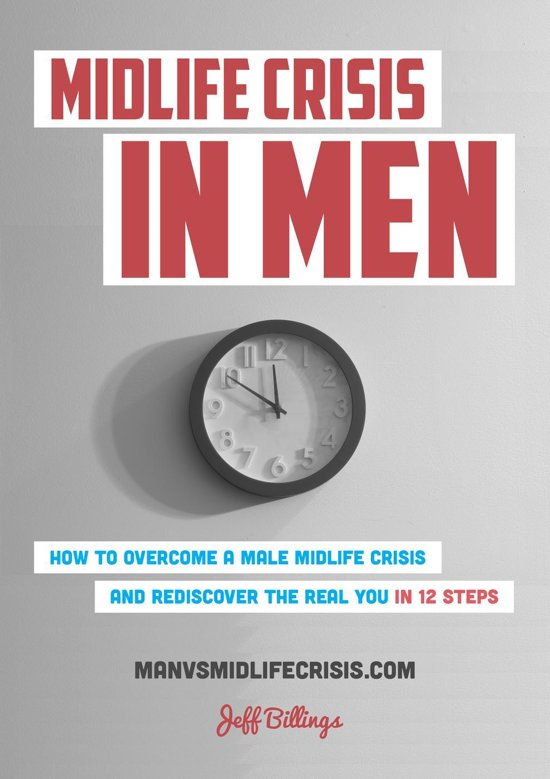 "And for many people, after this agonizing reappraisal, they decide to stay with what they’ve got."
"And for many people, after this agonizing reappraisal, they decide to stay with what they’ve got."
Signs that you're going through this midlife phase, or that you may soon, include:
You've hit your 40th birthday. Colarusso, who has a special interest in issues that affect adults as they age, most often sees men struggling with these midlife questions in their 40s and early 50s.
You're uneasy about major elements in your life. Colarusso says this may include not being satisfied with your career, your marriage, or your health, and feeling the urge to take action to make them better.
You feel that your time for taking a new direction is running short. Many men feel a pressing need to make changes, Colarusso says, when:
- They notice that their appearance is changing or their stamina isn't as high as it used to be.
- They become a grandfather.
- A friend or parent dies.
However, it's not inevitable to go through a midlife crisis when those things happen.
You're making unusual choices. Men may go through a "teenage-like rebellion" at this point in their lives, says Boston psychologist Lynn Margolies, PhD. "A sure sign you may be in a midlife crisis is if you are feeling trapped and very tempted to act out in ways that will blow up your life," she says. These may include:
- Drinking more.
- Having an affair.
- Leaving your family.
- Feeling that your life no longer fits you.
- You're more concerned about your appearance.
- You feel more desire for excitement and thrills.
Navigating Your Midlife Issues
A midlife crisis can lead to "growth or destruction" for men, Margolies says. You can look for the causes of the unhappiness you feel, then make thoughtful decisions to address them. That's growth.
On the other hand, making impulsive decisions, like trading in your familiar life for a relationship with a younger partner that quickly ends or buying a car you can't afford, leads to destruction.
During this season of your life, be sure to:
- Remember that your feelings aren't commands. Just because you feel like you have to escape your home, job, or marriage doesn't mean you have to actually do it, Margolies says. These feelings may indeed point to problems that need solving. But they may also fade or change over time.
- Be thankful for the good things. Take time to be grateful for the parts of your life that make you happy, Margolies says. Ask yourself how you'd feel if you took an action that caused you to lose them.
- Talk it over. Before you make major decisions, discuss them with someone whose advice you'll trust, Colarusso says. A friend, pastor, or mental health professional can give you another opinion on whether you're making wise choices.
- Ask whether your wishes are realistic. Men make plenty of successful changes in their 40s and beyond: Going back to college, traveling the world, or starting their own business.
 Just make sure your new goals are practical and within your grasp.
Just make sure your new goals are practical and within your grasp.
- Avoid jolting your loved ones. "Realize that you may not need to blow up your life to be happy," Margolies says. "But if it needs to be dismantled, then doing so thoughtfully will be less destructive to the people around you."
Midlife crisis in men. What is a midlife crisis in men?
IMPORTANT
The information in this section should not be used for self-diagnosis or self-treatment. In case of pain or other exacerbation of the disease, only the attending physician should prescribe diagnostic tests. For diagnosis and proper treatment, you should contact your doctor.
The midlife crisis in men is a transitional period of development, characterized by a change in life attitudes, a reassessment of experience and the definition of prospects. It develops between the ages of 35 and 50. Accompanied by repetitive thoughts about the meaning of life and missed opportunities, emotional temper, anger, aggressiveness, depression, provocation of conflicts, adultery, addiction to alcohol, a radical change of interests. Professional diagnostics is carried out by a psychologist during a conversation. The manifestations of the crisis become less pronounced if the recommendations of a specialist are followed. nine0006
Professional diagnostics is carried out by a psychologist during a conversation. The manifestations of the crisis become less pronounced if the recommendations of a specialist are followed. nine0006
- Causes of midlife crisis in men
- Pathogenesis
- Symptoms of a midlife crisis in men
- Complications
- Diagnostics
- Advice for midlife crisis in men
- Prognosis and prevention
- Prices for treatment
General
The name "midlife crisis" was introduced by the Canadian psychoanalyst E. Jacques to refer to the age period from 40 to 60 years, accompanied by a rethinking of the acquired experience, a loss of interest in the present. Later, the boundaries of the crisis were shifted, now its onset is often observed in 30-35 years. Men go through the transition more difficult than women. This is due to the high demands of society for career achievements and financial solvency, insufficient recognition of the importance of realization in family life.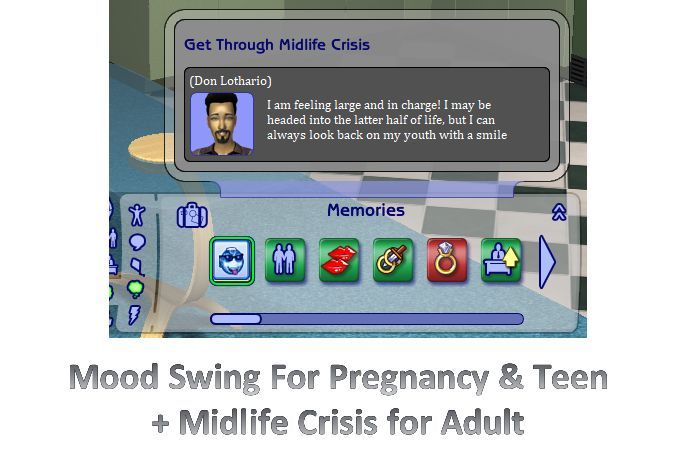 Symptoms of the crisis period are more noticeable among residents of large cities, among representatives of creative professions. nine0006
Symptoms of the crisis period are more noticeable among residents of large cities, among representatives of creative professions. nine0006
Midlife crisis in men
Causes of midlife crisis in men
All middle-aged men go through a crisis. The severity of symptoms - emotional experiences, behavioral disorders, personal and social maladjustment - is determined by social, cultural, psychological, material, household and biological factors. The following causes of severe crisis are common:
- Financial insolvency. Modern society ascribes to a man the role of "getter" as one of the main ones. At certain age stages, one recognizes oneself as successful or unsuccessful, depending on material well-being. nine0011
- Dissatisfaction with marriage. Personality crisis in men often coincides with the crisis of marital relations. By this time, the upbringing of children ends, life is fully equipped, the common interests of the husband and wife become less.

- Death of loved ones. The trigger for a crisis can be the death of a parent or friend. A man experiences a loss, feels loneliness more acutely, faces the realization of the finiteness of life.
- Deterioration of health. By the age of 40-50, changes occur at the level of physiology - flexibility, strength, endurance decrease, joint pain occurs, testosterone production decreases, the body ages. A decrease in working capacity contributes to the development of anxiety for maintaining the possibility of professional realization. nine0011
- Adherence to stereotypes. The media promote the "cult of youth", material and social success as a condition for happiness. Discrimination based on age is widespread.
- Psychological features. Men who are unsure of themselves and dependent on the opinions of others are more susceptible to experiencing a crisis. Orientation to the future, the ability to make plans and translate them into reality contribute to the easy overcoming of the transitional stage.

Pathogenesis
The origin of the crisis in middle age was studied in detail by E. Erickson. According to his theory, at the age of 35-50 certain developmental tasks are formed, for the solution of which it is necessary to master new skills and abilities. The successful completion of the crisis allows you to gain new experience and find peace of mind. The main task is to make a choice between the stagnation of the "I" (Ego) and generativity, that is, the spread of interests beyond the limits of one's own well-being. When implementing the second option, one identifies oneself with other people, with future generations, which partly solves the existential problem of the meaning of life, the inevitability of death. The choice of stagnation of "I" means a return and reconciliation with the mastered ways of functioning. A person prefers a familiar, comfortable state, refuses to experience stressful situations. Often in the future this leads to disappointment, dissatisfaction, depression. nine0006
nine0006
Symptoms of a midlife crisis in men
In men, the period of crisis is manifested by changes in the emotional and behavioral sphere. Thoughts arise about one's own insolvency, fear of approaching old age, hatred of the daily routine. Many men talk about the feeling of "being cornered", of wanting to change everything, to "turn it upside down". Depression, depression, irritability, anger increase. Attempts to change the situation and restore peace of mind are often destructive, as there is no understanding of the causes of emotional instability. nine0006
Men become more withdrawn in communication with close relatives. The former relationship with the spouse no longer satisfies the emerging needs for understanding, support, and recognition. Professional activity begins to seem monotonous, boring, preventing self-realization, the manifestation of creativity. In an attempt to resolve an internal crisis, men change external factors: they divorce their wives, quit their jobs, go in for sports, fishing, hunting, computer and gambling. A change in relationships and activities gives the illusion of an active life, a kind of return to youth. nine0006
A change in relationships and activities gives the illusion of an active life, a kind of return to youth. nine0006
Complications
Without the help of psychologists, the support of relatives, the crisis in men drags on, accompanied by destructive emotional and personal changes. The most common complication is depression. It is formed when there is a refusal to actively resolve the basic conflict, "leaving" the problem. Relationships and activities remain the same, but internal dissatisfaction accumulates, the idea of the meaninglessness of further existence, the unattainability of happiness, is consolidated. In addition, depression can develop after overcoming the crisis and assessing its consequences - the loss of marital, friendship, professional relationships, loss of career, income. nine0006
Diagnostics
Identifying a midlife crisis is the task of a psychologist. If there are no complications - depression, social and personal maladjustment - then the diagnosis is performed by the method of clinical conversation. As a rule, men are critical of their own experiences, are able to describe emotions, feelings, disturbing thoughts, fears, talk about actions. With complaints of depressed mood, apathy, prolonged melancholy, suicidal thoughts, a psychodiagnostic study is additionally performed to identify depression. Personality questionnaires are used (for example, LN Sobchik's Standardized Multivariate Personality Research Method), as well as specific scales (Zang Scale, Beck Depression Scale, Life Satisfaction Scale, and others). nine0006
As a rule, men are critical of their own experiences, are able to describe emotions, feelings, disturbing thoughts, fears, talk about actions. With complaints of depressed mood, apathy, prolonged melancholy, suicidal thoughts, a psychodiagnostic study is additionally performed to identify depression. Personality questionnaires are used (for example, LN Sobchik's Standardized Multivariate Personality Research Method), as well as specific scales (Zang Scale, Beck Depression Scale, Life Satisfaction Scale, and others). nine0006
Advice for midlife crisis in men
The age crisis is a natural stage of mental development; men who experience it do not need treatment. With pronounced manifestations of the transition period, the risk of divorce, job loss, the development of depression, it is worth seeking advice from a psychologist or psychotherapist. To overcome the crisis as easily as possible, you must adhere to the following recommendations:
- Provide emotional support.
 In a crisis, men begin to feel loneliness, misunderstanding of others, the pressure of rules and requirements in all areas of life. It is important for wives, parents, children to show patience, to become more interested in the affairs and experiences of a loved one. nine0011
In a crisis, men begin to feel loneliness, misunderstanding of others, the pressure of rules and requirements in all areas of life. It is important for wives, parents, children to show patience, to become more interested in the affairs and experiences of a loved one. nine0011 - Make productive changes. It is worth taking emotions into the background, assessing the productivity and destructiveness of changes in life. For example, instead of quitting your job, find an exciting hobby. Parents and wives should understand the man's need for change, do not resist it, do not create conflict situations, try to diversify the daily routine.
- Reduce requirements. During a crisis, men are acutely aware of any restrictions - rules of conduct, family traditions, daily routine, job responsibilities. If possible, it is necessary to abolish formal requirements, expanding the freedom of action. You can not compare with the successes of others, set the bar, make high expectations. nine0011
- Accept changes.
 A crisis is a time for deep inner work. It is important not to rush, to realize and analyze the feelings, ideas, plans that arise. The old situation of development (relationships, rituals, activities) can no longer satisfy the needs of the individual, one must understand the inevitability of changes and accept them.
A crisis is a time for deep inner work. It is important not to rush, to realize and analyze the feelings, ideas, plans that arise. The old situation of development (relationships, rituals, activities) can no longer satisfy the needs of the individual, one must understand the inevitability of changes and accept them. - Track the duration of a crisis. The duration of this stage ranges from 4-6 months to one and a half years. If emotional discomfort is observed for a longer time, it is recommended to consult a psychotherapist or psychologist. nine0011
Prognosis and prevention
The prognosis in most cases is favorable - the crisis, as a natural stage of development, has a beginning, culmination and completion with the formation of a new image of the Self, an understanding of one's purpose, priorities, values. Such certainty provides spiritual harmony, emotional balance - qualities that mark the transition to a stable period. It is impossible to prevent a crisis, but with the right attitude towards the upcoming changes, it is possible to reduce its duration and severity. It is important to follow the recommendations of psychologists and remember the temporary nature of difficulties. nine0006
It is important to follow the recommendations of psychologists and remember the temporary nature of difficulties. nine0006
Sources
- In case of pain or other exacerbation of the disease, only the attending physician should prescribe diagnostic tests. For diagnosis and proper treatment, you should contact your doctor.
What is a midlife crisis and how to overcome it
Many Friends fans will remember the episode in which the main characters go through their 30th birthday. Each of the characters in the American sitcom showed the most expected reaction to a midlife crisis: Joe experienced a panic, Monica drowned her despair in wine, Phoebe summed up her years, and Rachel experienced depression, broke off relationships and began to make plans for the future. And, of course, Ross bought a red sports car. But does everyone experience a midlife crisis, and what is the average age? Is it worth repeating the usual scenarios and clichés? And, most importantly, how to deal with it? nine0006
- What is midlife crisis
- Causes
- When the Crisis Comes
- Symptoms and signs
- Male midlife crisis
- Women's midlife crisis
- How to Survive
- How to help those in crisis
The article was checked and commented by Elena Fiveyskaya, psychologist, GMS Clinic coach
Advertising on RBC www.
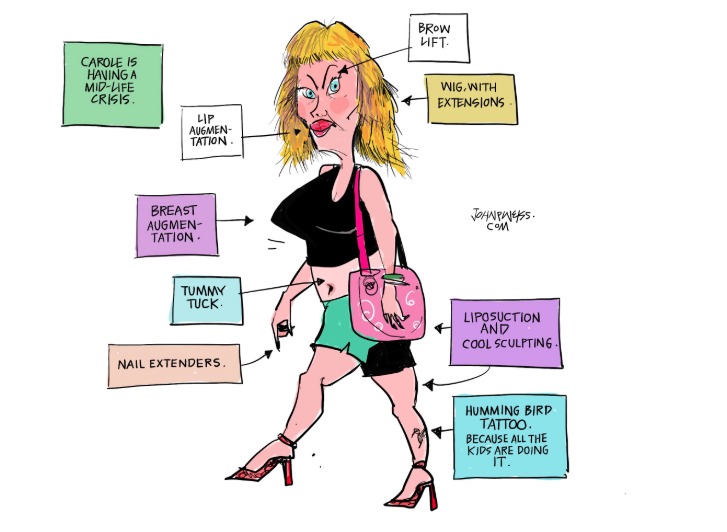 adv.rbc.ru nine0006
adv.rbc.ru nine0006 What is a midlife crisis
A midlife crisis is an emotional state that a person experiences at the age of 30-50, most often it is associated with a reassessment of life experience. It seems that many opportunities and dreams of youth are missed, while old age (or death) will come pretty soon. For different people, the crisis occurs at different ages, it depends on individual characteristics.
Crisis is often defined as a period of emotional upheaval and associated with a thirst for change. At the time of his experience, people try to fight the thoughts of old age. Many may forego responsibilities in favor of entertainment. That's why the term "midlife crisis" is often associated with buying a sports car or starting a new relationship. But middle age is also a time of reappraisal, debriefing, and self-determination, psychologists say. nine0006
Middle age is a time of reassessment, reflection and self-determination
© Shutterstock
Aging makes a person anxious and depressed.
 And a midlife crisis is a phase that helps you feel young again, because you don't want to put up with the fact that life is half over [1]. However, the emotional upheavals that people experience at this age do not always lead to major lifestyle changes associated with the desire to stay forever young. nine0006
And a midlife crisis is a phase that helps you feel young again, because you don't want to put up with the fact that life is half over [1]. However, the emotional upheavals that people experience at this age do not always lead to major lifestyle changes associated with the desire to stay forever young. nine0006 The term was originally applied only to men. He explained the fear of death that they experienced during this period. Today, the definition covers the physical, psychological, social problems faced by both men and women. However, many do not associate the midlife crisis with aging. So, in one of the surveys, men talked about problems at work or in the family, and women - with health and personal relationships.
Causes of midlife crisis
For many, middle age is a time when relationships and social roles change. Some people begin to care for aging parents, others feel lonely because adult children began to live separately . For others, this period becomes a time of regrets about missed opportunities [2].

Middle age can also be a time of deep reflection. People look back on the years they have lived and wonder what their life would have been like if they had taken a different path. Some begin to regret that they did not choose another career or did not accomplish what they once dreamed of. Others recall happier days of their youth. nine0006
Decline in happiness
One theory why some people experience a midlife crisis is that they experience a decline in happiness. Research shows that the feeling of happiness can be depicted as a U-shape. Where a gradual decline in happiness levels begins in late adolescence and continues until the age of 40. Happiness begins to grow again at 50 [3]. This hypothesis was confirmed by the data of half a million Americans and Europeans. During the survey, people in their 60s reported that they had never been so happy in their lives. While forty-year-olds felt very miserable. However, the U-shaped curve is not an axiom at all. nine0006
When does a crisis occur?
According to research, not everyone experiences a midlife crisis.
 Some scholars believe that the concept of crisis is a social construct. It is the belief that some kind of crisis must occur at 40 that makes people think that they are experiencing disappointment and breakdown.
Some scholars believe that the concept of crisis is a social construct. It is the belief that some kind of crisis must occur at 40 that makes people think that they are experiencing disappointment and breakdown. People feel lonely when their grown-up children start living separately
© Yan Krukov/Pexels
The US National Midlife Survey found that approximately 26% of participants experience a midlife crisis [4]. At the same time, the majority of respondents reported that it occurred in the period before 40 or after 50 years. These data cast doubt on the axiom that such an emotional state is directly related to age, since the average is usually considered to be 45 years. In addition, the vast majority of respondents said that the crisis was caused by a serious event in life, and not by age. These include divorce, loss of a job, loss of a loved one, or relocation. nine0006
Today, the age range of the midlife crisis has expanded, as men and women under the age of 30 and over 50 can experience it.
 And its onset is often due to personal characteristics and significant events in life.
And its onset is often due to personal characteristics and significant events in life. Symptoms of a midlife crisis
Psychotherapist Elena Elfimova in her book "Crisis of Personal Relationships" describes in detail the symptoms of a midlife crisis. Here's what you need to pay attention to:
- there was a need to improve physical fitness and appearance; nine0011
- there was a desire to actively move: running, cycling, dancing, extreme sports: racing, skydiving;
- made drastic changes in their diet or went on a diet, started taking vitamins or dietary supplements;
- buy new clothes and spend more time looking;
- change your hairstyle, color your hair due to natural changes in color, thickness and quantity;
- dramatically change the circle of friends, which is replenished by people of a younger age; nine0011
- feel dissatisfied with your own achievements;
- compare yourself with other people of your age who have achieved more;
- what used to bring pleasure is boring; there was a desire to quit a successful career;
- experience irritability, sudden fits of anger;
- you get tired faster, there are problems with memory, new diseases, the consequences of bad habits have accumulated;
- the need for sleep has changed: you want to sleep more or, conversely, less; nine0011
- became more prone to stress;
- like listening to other music, suddenly want to learn how to play a musical instrument;
- have a sudden interest in painting or writing;
- awakened interest in religion or philosophy;
- think about death more often, talk about its nature;
- trying to give new life to things that you bought 20 years ago;
- often remember your childhood; nine0011
- think about the future.
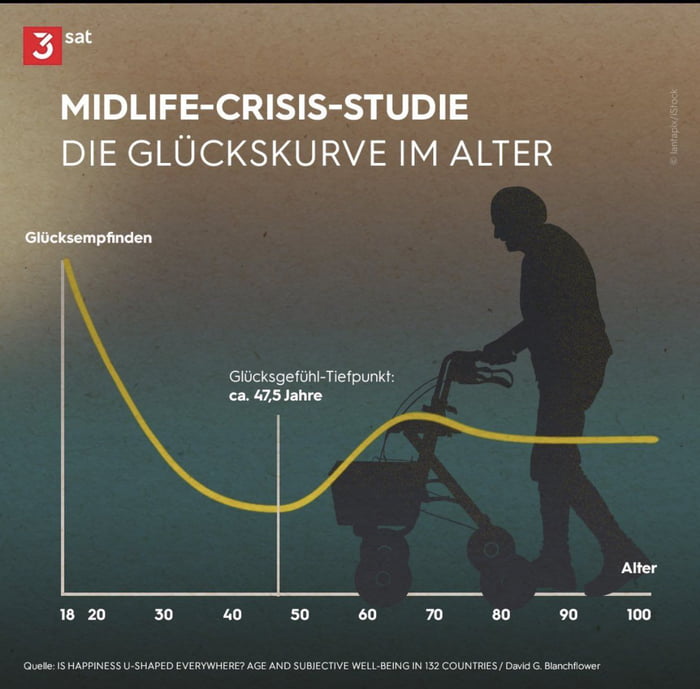
Midlife crisis in men
Men most often associate the crisis with life values and the search for oneself. At the same time, the search can imply both a change in profession, changes in family life, and cardinal changes in lifestyle. At this point, men often look back on their past years, question their achievements and begin to look for themselves in something else.
Men most often associate the crisis with life values and the search for oneself
© Andrea Piacquadio/Pexels
Signs of aging also play an important role: as a rule, health and physical abilities begin to deteriorate in middle age. Thoughts that you can be happier if you change something can cause men to have an emotional crisis and an acute desire for speedy change.
A midlife crisis usually involves changing lives in a hurry, says Calvin Colarusso, MD, professor of psychiatry at the University of California, San Diego [5]. As an example, he cites the case of his patient who wrote a note to his wife, withdrew money from a bank account and moved to another city without warning.
 But, according to Colarusso, this type of crisis is rare, more often men go through it less impulsively. nine0006
But, according to Colarusso, this type of crisis is rare, more often men go through it less impulsively. nine0006 Signs of a midlife crisis in men:
- You are over 40 years old. Colarusso most often sees men struggle with a midlife crisis in their 40s and 50s.
- You are concerned about the main areas of your life. This may include dissatisfaction with career, marriage, health, as well as a desire to change them for the better.
- You feel that there is little time to choose a new direction.
According to a psychologist, many men are in dire need of change when:
- appearance and physical form change;
- grandchildren appear;
- parents or friends die.
Ph.D. and psychologist from Boston, Lynn Margolis, believes that at this stage, men can experience "teenage rebellion." “A sure sign of a midlife crisis is that you feel trapped and strongly tempted to change your life,” she says. Attempts may include:
- addiction to alcohol; nine0011
- novel on the side;
- leaving the family, breaking up a long-term relationship;
- desire to add thrills.
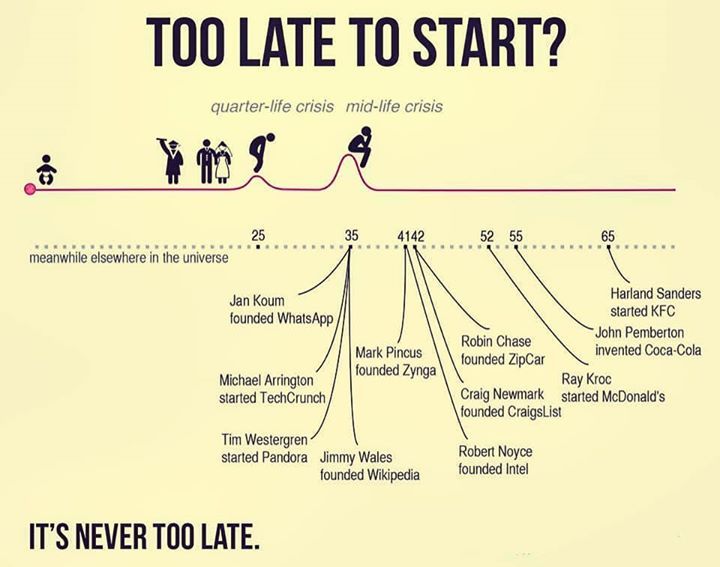
Midlife crisis can lead to both growth and destruction of personality. If you look for the causes of your unhappiness, and then make thoughtful decisions to eliminate them, this is growth, says the psychologist. And making impulsive decisions, such as walking away from a familiar life, having a relationship with a younger partner that ends quickly, or buying a car that is too expensive, leads to destruction. nine0006
A sure sign of a midlife crisis: you feel trapped and strongly tempted to make a radical change in your life
© Shutterstock
The psychologist encourages you to remember that feelings and impulsive impulses are not commands to action. After all, the desire to run away from home, work or family does not mean that it really needs to be done. These feelings may indicate problems that need to be addressed. In addition, over time, they may disappear altogether. Men make many successful changes in their 40s and older: get an education, travel, start their own business.
 It is important to make sure that the new goals are practical and accessible. nine0006
It is important to make sure that the new goals are practical and accessible. nine0006 Midlife crisis in women
Contrary to popular belief, the crisis affects not only men. Recent studies have shown that a similar emotional state is also characteristic of women from 40 to 65 years old [6]. During this period, they face not only physiological changes, but also problems at work, in family relationships, and in achieving financial and personal goals. The stress can be so intense that women may experience sleep disturbances and health problems[7][8]. nine0006
To avoid backlash, a midlife crisis is best viewed as an opportunity to re-evaluate your life, a chance to pause and spend time and energy figuring out what's important to you, says Susan Albers, PhD in Psychology.
Hormonal changes are the main difference in these situations, notes the psychologist. As women enter menopause, estrogen and progesterone levels decrease and cause physiological changes, including disturbances in sleep, mood, and sex drive [9].
 During perimenopause and menopause, hormone imbalances can also cause memory loss, anxiety, weight gain, and decreased interest in things you used to enjoy, according to Mayo Clinic doctors [10].
During perimenopause and menopause, hormone imbalances can also cause memory loss, anxiety, weight gain, and decreased interest in things you used to enjoy, according to Mayo Clinic doctors [10]. Signs and symptoms of a midlife crisis in women:
- depression and anxiety;
- lack of motivation or desire to devote time to certain activities;
- dissatisfaction with career and other life choices.
Emerging experiences can direct women's attention inward. And since they are more likely to care about the feelings and needs of others, such self-reflection can provoke an emotional crisis. In the role of mother, women may be more visible in society or have a strong bond with their children, psychologists say. But one day the children grow up and stop needing them. And when women do not devote all their attention to the family, they have time to think about their experiences.
Stress can be so intense that women may experience sleep disturbances and health problems
© Cottonbro/Pexels
How to Survive a Midlife Crisis
1.
 Embrace Change
Embrace Change It's not just gray hair and wrinkles that show age, fatigue does too. Therefore, the question of how to feel younger is increasingly being asked by psychologists and psychotherapists. Try not to attribute changes in appearance to age. They are also caused by unfavorable ecology, hard work and stress.
Maintain mental activity: enthusiasm and a positive inner attitude are good for appearance. nine0006
2. Take care of yourself
Look for ways to reduce stress, whether it's asking loved ones to share your experience or using stress management techniques such as meditation or mindful breathing. Take care of yourself, eat a healthy diet and get enough sleep.
3. Take care of your health
Talk to your doctor or gynecologist to help you understand what is normal in your condition and what is depression or anxiety. Consulting a therapist can also help you cope with negative emotions. nine0006
4. Train your brain
Age also manifests itself in increased fatigue and forgetfulness.
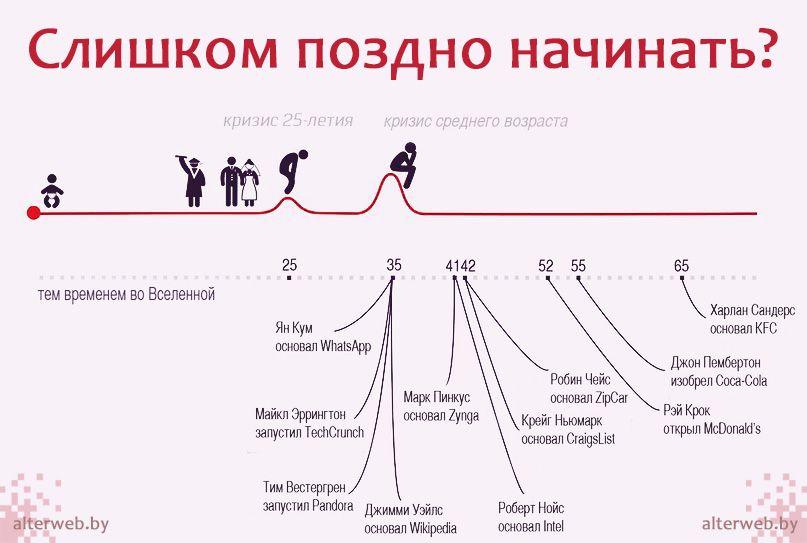 Over time, the brain loses the ability to adapt to new situations. Try to diversify the usual course of life: change the route to work, give up the car, walk more often and arrange interesting events with family and friends. Stop using the calculator and start training your brain with mental counting. You can also give up diaries and entries in your mobile phone: try to remember phone numbers, memorable dates and a to-do list. nine0006
Over time, the brain loses the ability to adapt to new situations. Try to diversify the usual course of life: change the route to work, give up the car, walk more often and arrange interesting events with family and friends. Stop using the calculator and start training your brain with mental counting. You can also give up diaries and entries in your mobile phone: try to remember phone numbers, memorable dates and a to-do list. nine0006 5. Get new emotions
Travel is one of the most common tips from psychologists. Sometimes a week spent in an unknown city or country can give more impressions than a whole year of measured life.
Look for ways to reduce stress
© Marcus Aurelius/Pexels
But going to the ends of the earth in search of new experiences is not an option for everyone, given the current pandemic. Previously unknown tastes and smells will help to get emotions and create neural connections. Try new dishes or buy an unusual perfume. In addition, you can diversify your leisure time with new hobbies.
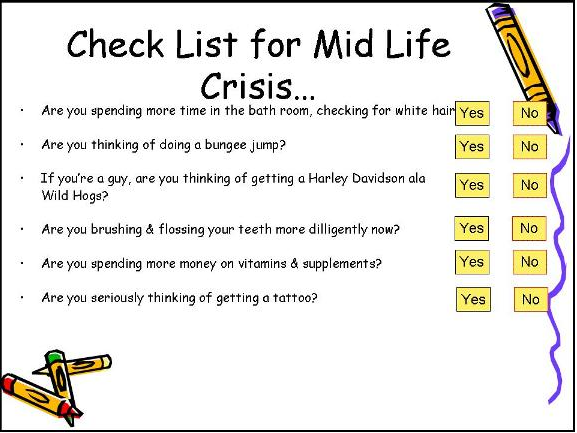 nine0006
nine0006 6. Be grateful
Take time to be grateful for the parts of your life that make you happy, psychologists advise. Try keeping a journal and write down what you are grateful for. Go back to your notes to see what you can change in your life.
7. Discuss your emotional state
Find accomplices. It is important to know that you are not the only one experiencing a crisis. Talking to others about how you feel is supportive. Those who have already gone through this state can share useful ideas and tips. Also, before making important decisions, discuss them with someone you trust. A friend or psychologist may have a different opinion about the correctness of your choice. nine0006
8. Do a self-evaluation
Try to understand what is important to you, what you spend time and energy on. Find out what takes energy instead of filling it. This process may involve restructuring relationships, getting rid of toxic people, finding new friends or hobbies.
 Let go of guilt and don't get discouraged by introspection. Realize that this is a necessity and allow yourself to explore the important questions of life.
Let go of guilt and don't get discouraged by introspection. Realize that this is a necessity and allow yourself to explore the important questions of life. When to ask for help
Sometimes going through a midlife crisis doesn't require professional help. Perhaps, in order to feel that life has been filled with meaning, a new hobby is enough. But this emotional state can affect well-being. A midlife crisis should be treated like any other emotional crisis. If you are experiencing unpleasant symptoms that worsen your condition, it is best to seek help from professionals.
Psychological consultation will help to cope with negative emotions
© Shutterstock
Here are a few times when you should consult a doctor or see a psychologist:
- emotional stress interferes with sleep or affects appetite;
- unable to concentrate on work;
- stress or mood affects relationships with loved ones;
- lost interest in entertainment and hobbies;
- are thinking about major life changes: ending a long-term relationship, changing careers, or moving.
 At the same time, the desire to make changes is born from the internal upheavals associated with age. nine0011
At the same time, the desire to make changes is born from the internal upheavals associated with age. nine0011
How to help those who are in crisis
Experiences during this period can be quite strong. So much so that it becomes difficult to endure them not only for a person, but also for his family, friends, colleagues. At this moment, people begin to splash out their emotions and aggression, or, conversely, to withdraw into themselves.
If you suspect a friend or family member is having a midlife crisis, you can help them.
- Become a good listener for loved ones, let the person talk about their experiences. Try to listen without judgment and refrain from giving advice. Let a friend share how they feel and let them know that you are there. nine0011
- Express your concern, concern more often. At the same time, it is better to avoid exclamations from the series: “It seems that you are having a midlife crisis ?!” Instead, try asking probing questions like, “You haven't looked like yourself lately.
 Are you all right?"
Are you all right?" - If necessary, talk to your loved one about the importance of getting professional help. Suggest talking to a psychologist or doctor. Keep in mind that the changes you see in a person may indicate health problems. For example, a thyroid disorder often causes mood swings. The specialist will help to rule out medical problems and determine if a psychologist is needed. nine0011
- When someone close to you refuses to seek help from a specialist, you can consult a psychologist yourself. A therapist can help you develop a plan to support the other person and set healthy mental boundaries.
- Get help right away if you notice that a loved one could harm themselves or others. If necessary, take him to the emergency room for examination. If a person refuses to go to the hospital, call an ambulance and do not leave him unattended. nine0011
Psychologist's comment
Elena Fiveyskaya, psychologist, GMS Clinic coach
What is the difference between midlife crisis in women and men?
Any age crisis is a turning point, a transitional moment that has its own stages and patterns of development.
 In this midlife crisis in men and women is the same.
In this midlife crisis in men and women is the same. First of all, both of them will definitely have it: it will affect almost everyone. Secondly, it is directly related to its name - namely, it comes in the middle of life (median). This means that both a man and a woman will begin to compare their expectations from life with what has been achieved, can still be achieved, and with what has been lost forever. nine0006
But there are differences. The first is the age difference. If we do not take into account the tails of the distribution (for example, genes that allow a woman under 40 to look 20), then a woman begins to observe the first heralds of age-related changes by the age of 30.
If a woman has not yet given birth, then thoughts about the mythical biological clock sometimes fly into her head, becoming more insistent. Men have fewer such restrictions, at 30 they, for the most part, firmly believe that everything is still ahead. nine0006
The second difference is the goal that a woman and a man want to achieve.
 There is an opinion that it is more important for a woman to realize herself in a family, and for a man - in a career. But, in my opinion, this stereotype is outdated, and many men today dream of a child, and women put their career first.
There is an opinion that it is more important for a woman to realize herself in a family, and for a man - in a career. But, in my opinion, this stereotype is outdated, and many men today dream of a child, and women put their career first. The third factor involved in the reassessment of one's abilities in middle age is related to the sexual sphere. These are menopause in women and erection problems in men. And here again we can note the difference in age limits (as well as with procreation). nine0006
But the main difference that I want to point out as a psychologist is what avoidance strategies (instead of accepting current changes) are used by men and women in the midst of a midlife crisis.
In men, trying to regain youth by committing reckless acts is the most common behavior. As they say, gray hair in the head is a demon in the ribs. They are trying to emotionally return to the pre-crisis state.
A woman, on the other hand, makes attempts to do it bodily: she decides on braces, plastic surgeries, rejuvenation procedures - all this is a multi-million dollar business that is based on the midlife crisis of the beautiful half of humanity.
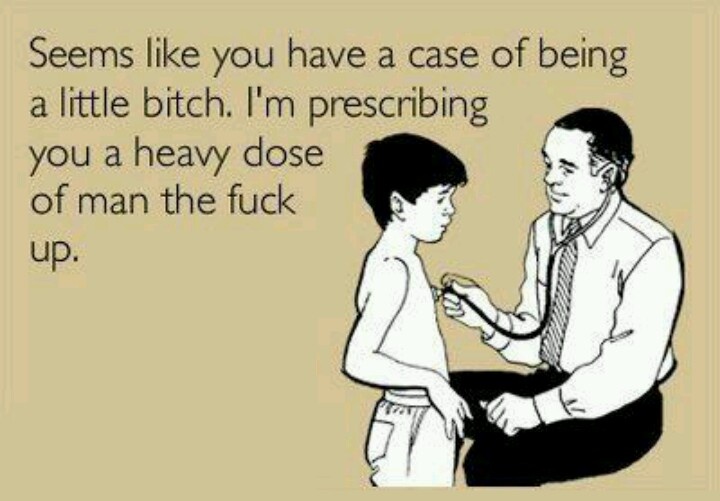 nine0006
nine0006 Once again, I want to emphasize that the differences between men and women are changing these days. A woman can run to buy a new Porsche, a yacht, or get a lover younger than herself, just as a man can maniacally improve his appearance.
Women do not lose the ability to receive the same vivid emotions as in their youth. In men, the emotional sphere fades, everything becomes boring, and life becomes like a “Groundhog Day”. Therefore, often men look for emotions in a new marriage, re-participate in the birth of children, experiencing this process in a different way, more consciously, as it seems to them. nine0006
A woman is more masochistic by nature, it is easier for her to devote herself to something else: a man, a child, projects. Because of her nature and ability to be a mother. Without the masochistic part, the stage of childbirth and postpartum care for the baby seems rather difficult. Therefore, this is inherent in a woman.
How long can a midlife crisis last?
Long enough if the person does not advance to the next level.
 In especially severe cases, such a crisis can break a person. nine0006
In especially severe cases, such a crisis can break a person. nine0006 Perhaps you have come across or even among relatives there are elderly people who are stuck in the past, have lost the meaning of life and do not expect anything more from this world. Usually they say about them: “She was never able to start a family, he never recovered from losing his job, etc.” Missed opportunities remained in the past, and the person did not set new goals for himself.
But there are also opposite cases, when a crisis pushes a person to his destiny, to what he always wanted to do, but for some reason did not do it. nine0006
Is there a complex treatment, crisis therapy?
The main therapy is a visit to a psychologist. A crisis is not a disease, but a transition from one phase of development to the next. If in adulthood there are difficulties in accepting some new circumstances, this is work with the psyche and defenses. A psychologist will help you understand what is stopping you and how to deal with it.
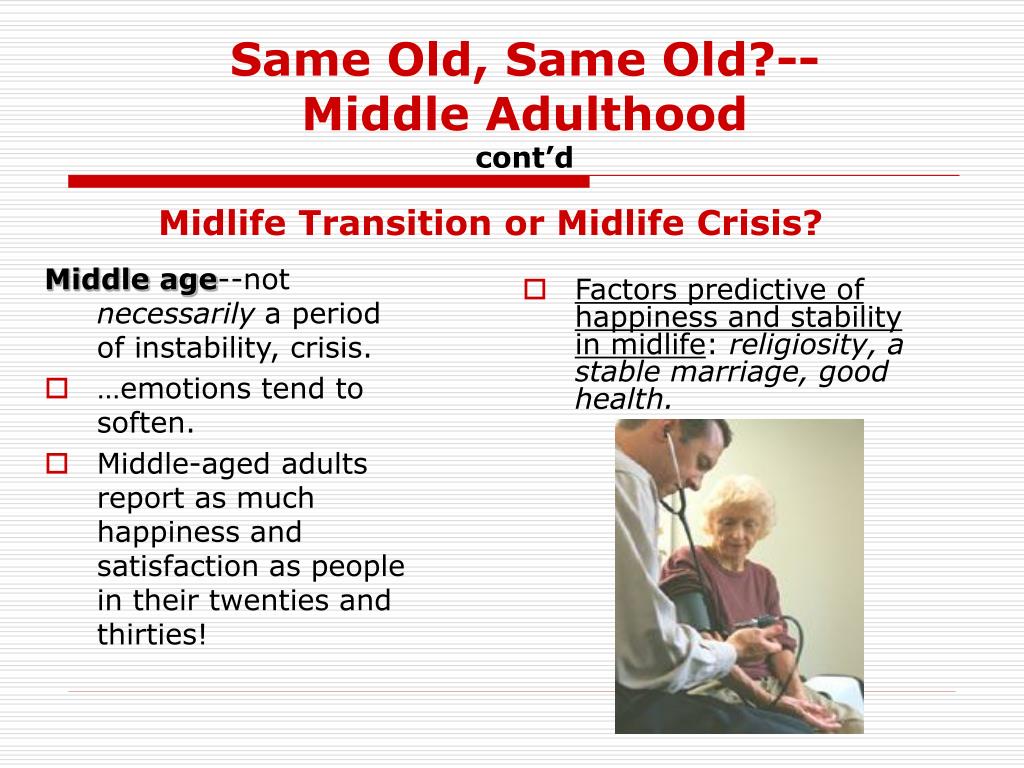 In some cases, you will have to burn yourself out, in others - to change the strategy, and thirdly - to set new goals.
In some cases, you will have to burn yourself out, in others - to change the strategy, and thirdly - to set new goals. How to help yourself with signs of a crisis? nine0006
It is extremely difficult to get out of the crisis on your own. I already wrote about the defenses of the psyche, which will not allow us to move on if we have not closed some specific goals, desires, our “wants”. There will be attempts again and again to get what you want, even if it is impossible. It also depends on the actual achievements of a person in comparison with his expectations. In this case, perfectionists will have a particularly hard time.
The only thing I would like to advise is not to compare yourself with others, everyone has been given a different amount of resources (both external and internal). So, even a successful businessman will be a loser compared to a person on the first line of Forbes. Another recommendation is to explore new areas, opportunities, everything new as much as possible, because the old is either unattainable, or has already been achieved and interest is lost.
 nine0006
nine0006 How can loved ones help those who are in crisis?
Everything is very individual and depends not only on the personality of loved ones and the one who is going through a crisis, but also on the peculiarities of the relationships that have developed between them. If even before the crisis the relationship was not trusting, and the personality was closed and secretive, then attempts to abruptly change course can unsettle even more.
It is important to pay attention to the reduction of possible criticism, to shift the focus to achievements. Notice the destructive thoughts of your loved one and challenge them. Talk if possible. Engage in new events, activities. nine0006
Are there any consequences of the crisis? Which?
Of the negative ones - the destruction of the personality (family, career), which may be accompanied by alcoholism, drug addiction, loss of faith in oneself or severe mental illness. Of the positive ones - new opportunities, a surge of energy for their implementation, another opportunity to turn your life in the right direction.





